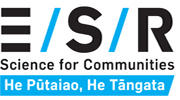Te Niwha offered its first summer studentships in late 2022 and the findings will make for valuable contributions to infectious disease research. For one particular student this has been an important step towards her postgraduate studies.
Biological Sciences and Psychology student Sophia Hamada spent her summer doing genomics research of Staphylococcus aureus isolates from bone infections (osteomyelitis) in children. She was supervised by Associate Professor Simon Swift (Medical and Health Sciences, Auckland University) and Senior Scientist Dr Christina Straub (Health and Environment, ESR).
This research fits into a wider project which Associate Professor Swift is already involved with.
“I’m part of a team looking at ways to deal with Staphylococcus infections of the bones. This project started with Auckland Academic Health Alliance (AAHA) funding to look into paediatric osteomyelitis.”
Hamada had taken a particular interest in Associate Professor Swift’s work previously and reached out to discuss postgraduate studies in future.
“When notification of the Te Niwha studentship came in, I immediately thought this might be something Sophia would be interested in.”
After Hamada’s successful application, the pair reached out to Dr Straub.
“We reached out to Christina because of her expertise in bioinformatics and specifically bacterial genomics,” Associate Professor Swift says. “This is something Te Niwha can do, bring people from different organisations together to combine areas of expertise.”
“In my research I wanted to find the types of antibiotic resistance genes, virulence factor genes and in particular, biofilm formation genes, which might play a role in bacteria being more tolerant to antibiotics,” Hamada says. “I met up with Christina and she helped me with the genomics work as I hadn’t applied it to real life situations before.”
Since completing her studentship, Hamada has enrolled in her Masters (Biomedical Science). Associate Professor Swift says the work Sophia undertook this summer has been an important way to develop skills she can practically use in her research career.
“The good thing about getting Sophia and Christina working together is the training Sophia can now apply to her own work. She has learned to work with sequencing data, how to assemble genomes and is now equipped with the computational skills to do detailed analysis with the genomes in her master’s research.”
This year Hamada will be collaborating with others in the laboratory as she looks at isolates resistant to the antibiotic used to treat osteomyelitis.
